Why You Should Stay at Independently Owned Hotels
Darn Good Digs only includes independently and locally owned hotels in our accommodations guide, and we do so for important reasons. We strongly believe that locally owned hotels, together with all independent businesses, give our communities character and vitality. They provide diversity in an increasingly homogenized world. Yet for us, staying independent isn’t just about being conscientious travelers. We stay at locally owned hotels because we enjoy them more. We believe they make travel more rewarding and personalized. Next time you hit those guide books or scour the internet looking for a room, think twice before booking that name-brand hotel, and consider these six reasons why you should stay at an independently or locally owned one instead:
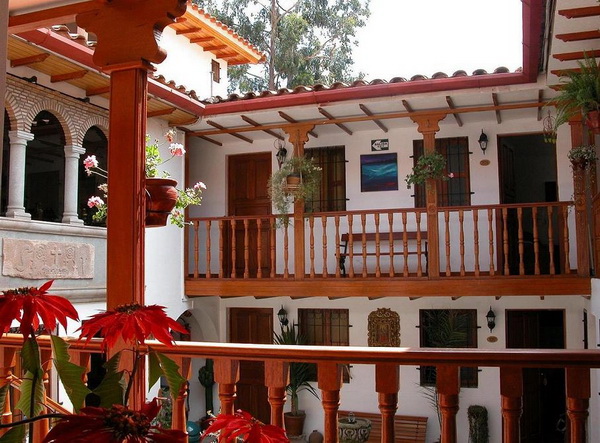
Hotel Rumi Punku in Cusco, Peru
1. Independent hotels best capture the very essence of travel. McDonald’s and Holiday Inn both thrive because people value consistency. Some of us like to know that no matter where we go, we can count on the same reliable experience every time. But travel is inherently about change: leaving the routines of daily life, visiting some place different, and meeting new people. By seeking out independently owned hotels, a traveler leaves the standardized and ordinary in search of something extra-ordinary and unique. For example, when you step through the doorway at Rumi Punku (above) in Cusco, Peru, you are actually entering the hotel through an authentic Inca ruin.
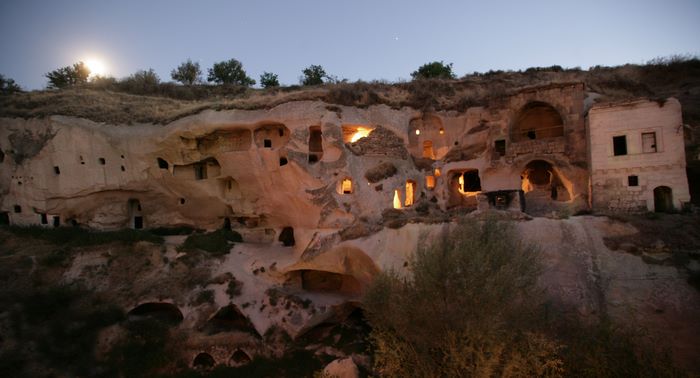
Gamirasu Cave Hotel in Ayvali, Turkey
2. Independent hotels make each village, town, and city different from the next. If we don’t want everywhere to look the same, we need to support independent businesses – hotels included. Too many towns and cities across America could be mistaken for one another, because they have the same restaurants, gas stations, convenient stores, and motels. For the past thirty years, this trend has been exploding on an international scale with Marriott in Karachi, Best Western in Accra, and Sheraton in San Salvador. If we don’t support local businesses, at home and abroad, future travelers may one day find that the rest of the world looks a little too much like home. In some places, maybe that’s already the case. An example of a locally owned hotel that is anything but conventional is the Gamirasu Cave Hotel (above) in Turkey’s Cappadocia region, where a hotel inhabits ancient cave houses and a thousand year old monastic retreat.
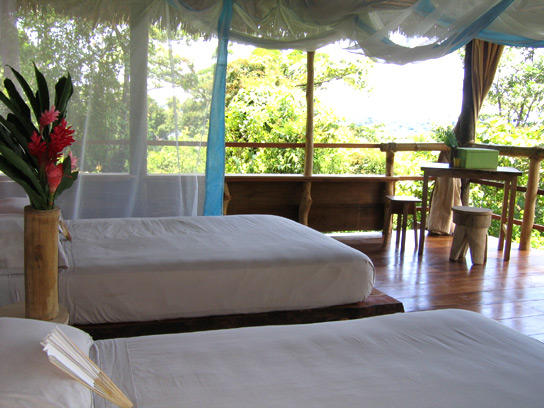
La Loma Jungle Lodge in Bocas del Toro, Panama
3. Locally owned businesses keep more money in the local community. That is true here in the United States, and it’s also true in more cash-strapped nations around the world. According to the American Independent Business Alliance, local businesses, including hotels, “carry a higher percentage of locally-produced goods than chains, meaning more jobs for local producers. In contrast, a new chain [hotel] typically is a clone of other units, eliminates the need for local planning, and uses a minimum of local goods and services. A company-owned store’s profits promptly are exported to corporate headquarters.” Plain and simple, if you want to support local communities when you travel, then you should stay at independent hotels. Case in point, La Loma Jungle Lodge and Butterfly Farm (above) on Panama’s Isla Bastimentos uses locally grown foods for its meals and employs local indigenous Ngobe guides for its tours. What’s more, La Loma founded the Hoodi Chi program in 2004 to help support the forty Ngobe families living in the area.
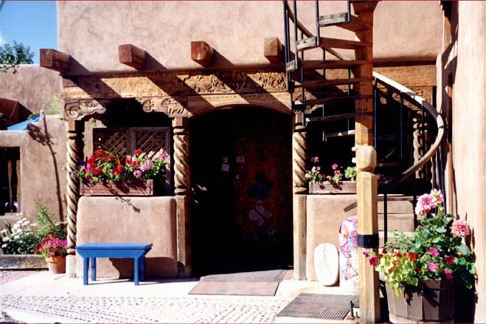
La Dona Luz in Taos, New Mexico
4. Independently owned hotels promote cultural exchange. Travel can be eye-opening and enlightening for both travelers and locals alike, but the travel industry can also be the greatest enemy to cultural exchange as well, by designing gated communities and all-inclusive packages. Isolation works incredibly well to stifle any cultural exchange between travelers and locals. In contrast, smaller, locally owned hotels are generally part of the fabric of a community, and do a better job at bringing together locals and out-of-towners. For example, La Dona Luz (above) is a bed and breakfast run by the grandson of an early 20th century Taos artist, and is housed in a 200 year old adobe building in the heart of downtown Taos, New Mexico.

Beyin Beach Resort joined local fishermen in Ghana to found the Beyin Turtle Conservation Project.
5. Independently owned hotels are better for the environment. Many large hotels chains have recently worked hard to establish their green credentials by encouraging guests to re-use their towels, printing their pamphlets on recycled paper, and using biodegradable shampoo containers. We don’t mean to discount these gestures, or question their motives, because every bit of increased efficiency and decreased waste helps. But in general, independent hotels do a better job at being green, even without trying, just because of their smaller scale and increased reliance on local suppliers. On top of that, many bed and breakfasts and hostels have taken a lead in adopting sustainable practices. For example, the Beyin Beach Resort (above) in southwestern Ghana has partnered with local fishermen to establish the Beyin Beach Resort Turtle Conservation Project to help protect endangered sea turtles.
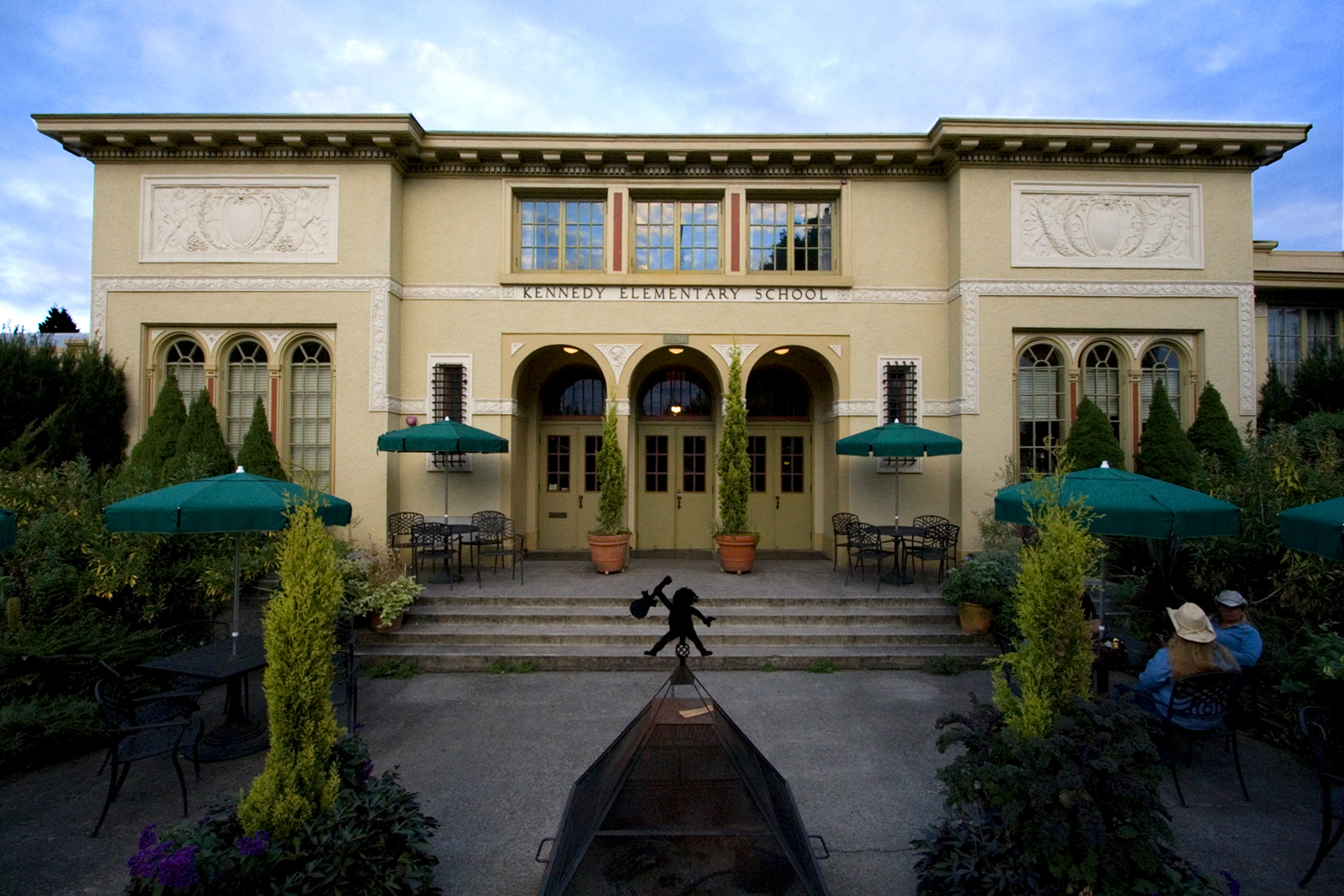
Kennedy School in Portland, Oregon
6. Independently owned hotels better maintain the character of a local community. The beach-front high rises of Cancun and the mega-resorts in Playa Dorada could not be more different than the “authentic” character of Mexico or the Dominican Republic. In contrast, independent hotels are more likely to use existing buildings, like Victorian homes, or design appropriately scaled architecture. For example, the McMenamin brothers transformed a 1930’s elementary school into the Kennedy School (above), a popular hotel, restaurant, bar, and brewery in Portland, Oregon.
We’ll be the first to admit that there are times and places to stay in chain hotels, like that morning we had to catch an 8am flight out of Madrid. And we’ll concede that there are plenty of independent hotels that don’t deserve our travel dollars, for any number of reasons. In fact, therein lies the problem for many travelers who might otherwise choose to stay independent – they worry about quality for some place they’ve never been. Our answer to that problem at darngooddigs.net is research and word-of-mouth. Sure it may take more work than just booking a room at the Hampton Inn or Hilton, but we think the extra effort is well worth it. We’ll bet that you will too.
Comments
Comment from Sylvie
Time February 17, 2010 at 12:08 am
Wonderful article. As the Director of Mexico Boutique Hotels I’v spent the last decade helping to promote small, independent hotels in Mexico and I firmly believe they offer the very best venues to truly discover a destination and a country. You mention important points and I thank you for reminding us how important and enriching it can be to support small business owners and their dream. Gracias!
Pingback from Hoteles Boutique de México – BLOG » Blog Archive » 6 razones para preferir hoteles independientes
Time February 18, 2010 at 7:26 pm
[…] amigos de Darngooddigs.com publicaron un recordatorio de las principales razones que uno deberia hospedarse en un hotel […]
Comment from Hassan Wanini
Time September 30, 2011 at 6:23 pm
What a shame Kenya isn’t on your list.
My personal recommendation is “Mpunguti Lodge” on Wasini Island, Kenya.
Travel there and have a look!
Pingback from Old World Charm at the Magnuson Grand Hotel in Warren, OHIO | connextionsmagazine
Time December 19, 2012 at 1:41 pm
[…] http://darngooddigs.net/blog/2010/01/why-you-should-stay-at-independently-owned-hotels/ […]





Comment from heather -the kiwitravelwriter
Time February 15, 2010 at 7:05 pm
great piece . I like to stay at small and local places as it means i get to know real people and leave my money in what are often places with low economies.
however, i can say that the YHA in New Zealand does provide very fidderent accom in every hostel – they’re a certainly not a ‘chain’ in the sameness sense.
I have stayed at very small hostel type accom in Kota Bharu,Malaysia about 5 times and no matter how many years later i turn up, they greet me by name!!! (Zecks homestay )